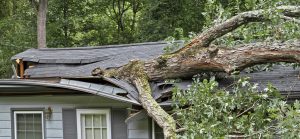
A large oak tree falls on and into a small house during a storm demolishing its roof
When Ponce de Leon discovered Florida he fell in love with its lavish landscape and beautiful plants. Given lush natural beauty he observed he named this newly discovered land “La Florida” or a place for flowers. Indeed, South Floridians today are known to adore their plants and flowers. But between neighbors, trees can often be a source of dispute. Which begs the question, who is responsible for the damage caused by that fallen tree?
In South Florida, neighbors often squabble over trees and debris said trees may shed. But many may not know what their legal rights are as it relates to those trees and their real estate. This post aims to shed some light on those issues.
A common source of dispute between neighbors is the overgrowth of trees and brushes. It should come as no surprise to any South Floridian of the presence of trees on one’s property that extends to the neighbor’s property. That extension could be in the form of over-hanging branches, or roots, or both.
That overgrowth often begs the question – who is responsible for the overgrowth of branches and roots and that damages that may flow from that overgrowth.
The Third District Court of Appeal in Gallo v. Heller, 512 So.2d 215 (Fla. 3d 1987) answered this question by stating that:
a possessor of land is not liable to persons outside the land for a nuisance resulting from trees and natural vegetation growing on the land. The adjoining property owner to such a nuisance, however, is privileged to trim back, at the adjoining owner’s own expense, any encroaching tree roots or branches and other vegetation which has grown onto his property
In Gallo, Gallo sued his neighbor, Heller, claiming that Heller’s ficus and melaleuca trees encroached into Gallo’s property causing damage to Gallo’s property. The court ruled that while Gallo may not recover damages from Heller for the encroachment of Heller’s plants, branches, and roots, on Gallo’s property, Gallo may nonetheless take any measure necessary to trim or cut any of Heller’s plants that may be on Gallo’s property.
Simply put, one is permitted to take any steps necessary to trim or cut any overhanging branches or roots that comes on to one’s property, but one cannot take any action as it relates to the source of the branches or roots if they are not on one’s property.
Another issue that often arises stems from damage caused by dead trees as well as live plants. The general rule is that if a live plant, or tree, falls onto a neighbor’s property causing damage to the neighbor, then the owner of the live tree is NOT responsible for the damage caused by the live tree. However, if the tree or plant is dead and that dead tree or plant falls onto the neighbor’s property, and causes damage, then the owner of the dead tree IS liable for any damage caused by the dead tree.
Of course, the best method of resolving neighborly disputes is to keep an open mind and maintain the ability to openly speak with your neighbor about the issues. The legal process should be viewed as a last resort as a lawsuit may do more harm than good in terms of maintaining a harmonious neighborhood.